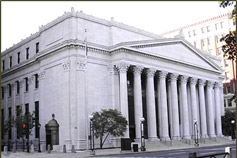United States District Judge for the District of Connecticut
Staff Information

RICHARD C. LEE UNITED STATES COURTHOUSE
141 Church Street
New Haven, Connecticut 06510
Location: Courtroom 2
| Neha Srinivasan | Law Clerk | 203-773-2456 |
| Preston Fregia | Law Clerk | 203-773-2456 |
| Mikaela Rabb | Law Clerk | 203-773-2456 |
| Frances Velez | Courtroom Deputy | 203-773-2056 |
| Heather Ireland | Court Reporter | 413-427-0344 |

RICHARD C. LEE UNITED STATES COURTHOUSE
141 Church Street
New Haven, Connecticut 06510
Location: Courtroom 2
| Chambers Telephone | 203-773-2456 |
| Clerk's Office Telephone | 203-773-2140 |
| Clerk's Office Fax | 203-773-2334 |
| Intern Hiring |